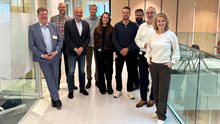Update: FNS-Human Capital Agenda
Future Network Services not only has the objective of making the Netherlands a technological leader in the field of 6G, but also wants to be a leader in the way Human Capital is developed and applied.
Work package 4.4 is building the Human Capital Agenda for the FNS program and consists of the following partners: KPN, Alliander, Sabic, Ericsson, VodafoneZiggo, Gomibo, Qualinx, TU Delft, Hanze, Summa College, ROC Amsterdam, TNO, Oost.nl, BTG Services, PTvT and the municipality of Rotterdam.
The necessity of a responsive labour market
In broad terms, the work package aims to create a responsive labour market that responds quickly to disruptive technological innovations through close cooperation between educational institutions, companies and research. This will ensure that the right skills are developed in a timely manner.

6G and the labour market
The effects of 6G on the labour market are not yet entirely clear, because the applications of 6G are not yet fully mapped out. To gain more insight into this, TNO is currently conducting a labour market study on behalf of the working group. The research question is: ‘What is needed in the area of human capital to make optimal use of the possibilities of 6G?’
This study will be completed in May, but a broad inventory has already been made. In short, the components of the issue can be divided into two areas:
- Network technology (development, construction and management of the network)
- Applications (development and use of new applications).
It is a large and complex issue, the impact of which on human capital will be very diverse. In order to substantiate the conclusions properly, more interviews will be held and additional desk research will be done.
The importance of Learning Communities
Every HCA has the development of Learning Communities (LCs) in them, and we expect this to be the case here as well. Open grant applications will be submitted for this in the second phase of the FNS program.
Within a Learning Community, businesses, education and research work together on innovation projects, also known as the Triple Helix Model. In addition, regions are asking for a regional approach with national coordination, because each region is slightly different. That is why we have identified four regional locations that together can offer national coverage, and we are looking for regional initiators.
Next steps in 2025
The labour market study is expected to be completed in May. Based on the results, we will draw up an action agenda aimed at concrete steps to address the Human Capital issue. We will also submit our proposal for Learning Communities at the end of 2025.
Want to know more?
If you would like to know more about the FNS-Human Capital Agenda, please contact John Herfkens (j.herfkens@ptvt.nl) and Linso van der Burg (l.vanderburg@ptvt.nl).
